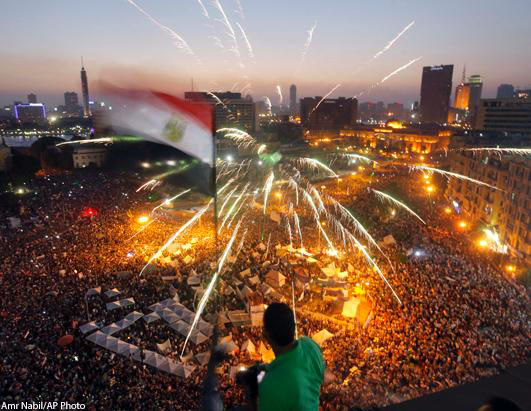Numbers, numbers everywhere, but not an accurate statistic in sight
By Peter Schwartz, contributor, EgyptianStreets.com
‘So let me get this straight: how big were the demonstrations?’ an Irish friend recently asked me.
I hummed and hawed, bandied around a few possible statistics, but then embarrassed, was forced to admit I didn’t really know. He was mightily unimpressed. After regaling him with tales of Ittihadeya crammed to the gills and suffocating-room only in Tahrir, I was supposed to have a good grasp of the situation.
I don’t, though, at least not when it comes to providing precise, or even vague figures.
In this, however, I’m far from alone, because Egypt, whose Pharaohs were conducting censuses when most Europeans were just about getting to grips with the wheel, has a problem with numbers.
Take June 30th as a case in point: 33 million people protested against Morsi, many of his opponents say. It was more like 17 million, his more modest adversaries have asserted. No, it was around 14 million, an army official declared. A Morsi-supporting mathematician calculated a mere 2.8 million.
‘Egypt is not India,’ journalist Bassem Sabry humorously pointed out, in mocking some of the more outrageous claims, but it’s almost beside the point as to how large the turnout really was.
What is shocking, though, is how quickly these desperately unscientific and unverified numbers were seized upon and spread.
Scarcely pausing to draw breath, most state and private TV networks –intent on airing as much justification of Morsi’s overthrow as possible- picked up and broadcast these figures without so much as a questioning their origin.
Now, Egypt is hardly unique in its political actors’ willingness to play fast and loose with the truth, nor is it unusual to record wildly divergent protest claims (Paris Police said about 150,000 demonstrators marched against gay marriage in late May, while the event organizers insisted the number was more than double that.), but statistical ignorance and controversy seem to permeate every sector of Egyptian life.
Egyptians can’t even reach an approximate consensus on the country’s population. Granted it’s been seven years since the last national census, but media guesses range from 78 million to 92 million (with even Reuters citing between 84 million and 90 million over the past few months).
Just how is a country to determine whether a majority of its people support regime change if it can’t settle on a ballpark estimate of its own size?
More seriously still, bickering over numbers has extended into the always complicated realm of religion.
A number of Salafi preachers have sought to emphasize Egypt’s Islamic character by downplaying the size of the Coptic minority. In turn, some Copts are prone to exaggerate their numbers beyond the generally accepted figure of 8-10% in order to underline their significance in Egyptian society.
Lebanon exists as a somewhat cautionary tale of the dangers of politicizing numbers. It hasn’t conducted a census since the foundation of the state for fear of illustrating its stark sectarian rifts.
Egypt is infinitely more homogeneous than many of its neighbours but has enough problems without contending with increased religious divisions. Last year the head of Egypt’s statistical body announced that Copts accounted for little over 6% of the population. He was promptly assailed from all sides and soon backtracked and denied having said any such thing.
Such instances are reflective, however, of a much graver problem.
Egypt’s statistical vacuum allows prejudiced political and media players to fill the void with whatever figures best suit their chosen narrative.
Twitter hardly helps of course. Misinformation flows as readily as celebrity gossip on many social network sights. But while TV channels and newspapers the world over are intent on championing a particular agenda, it bodes ill for a country’s future when its news sources habitually broadcast self-serving hearsay and rumour and pass it off as substantiated fact.
‘You are entitled to your own opinion, but not your own facts,’ the late great US Senator Daniel Moynihan once said. And while the stakes in Egypt couldn’t be higher right now, individuals and organizations alike would do well to think before they peddle phony figures.
I mean, 33 million? Really?







Comments (14)
My thoughts exactly. There is no way they have any numbers at all. They funniest thing was when they spread the rumour that the numbers was based on Google Earth. 6 to 12 months old sattelite pictures are hardly the best pieces of evidence.
I have long ago stopped taking aything stated as facts in Egypt as true.
Reblogged this on Ned Hamson Second Line View of the News and commented:
It was enough people to show that many more than voted for the past elected government had decided that he was wrecking Egypt and had to go.
Again with your wishy washy facts! You couldn’t possibly know that yet you say it with conviction.
I wonder what else you lie to yourself about on a daily basis.